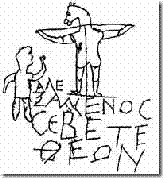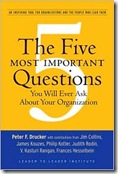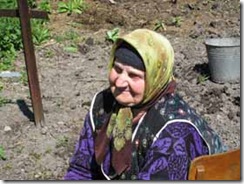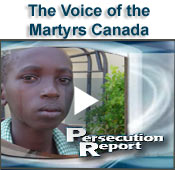I have been reading through Meditations on the Cross, a collection of writings by Dietrich Bonhoeffer as part of my daily devotions. In today's reading, I read a letter by Bonhoeffer to a friend in which he resists calling his two-year imprisonment "suffering". And it struck me just how often persecuted Christians resist calling what they are going through "persecution". Coptic Christian leaders in Egypt frequently deny that the church there is undergoing persecution. In recent article in Time, Leah Ortiz, the mother of 15 year-old son Ami who was injured by a bomb disguised as a holiday gift package, when asked if Christians are persecuted in Israel, denied it. I often find in discussions with expatriates from religiously restricted nations that they deny that there is persecution back in their homeland. This is puzzling to many, leading some to conclude that perhaps groups like The Voice of the Martyrs aren't exactly telling the truth.
It seems to me that a large part of the problem has to do with a misunderstanding as what exactly persecution is. Persecution to many conjures up images of extreme violence, martyrdoms, imprisonments and torture. They think of what they imagine the early church went through or the church in the former Soviet Union. Expats think back to their own experience and while they may have faced societal discrimination and the like, they took it in stride as everyone else did and saw it is just a part of life; unpleasant perhaps, maybe even annoying or slightly humiliating, but hardly persecution.
Two points need to be made:
First, it is worth remembering that persecution on a country-wide scale is rare in history, both now and throughout history. In most countries, violent persecution tends to be focused in specific, often remote, areas where religious tensions have been enflamed for one reason or another. Hence, believers in one city may never experience violence for their faith while in another, Christians are being beaten and driven from their homes.
Second, persecution as a term needs to be understood in its biblical sense. As Charles L. Tieszen reminds us, persecution in the Bible manifests itself within a broad spectrum ranging from mildly hostile to intensely hostile actions. These actions range from ridicule, restriction, certain kinds of harassment, or discrimination on one end of the spectrum to torture, imprisonment, ostracism, or killing on the other. Persecution, hence, must be understood to encompass actions spanning the full range of hostility whether they are violent, physical, psychological, or social. Tieszen reminds us that we cannot define persecution based on the level of harm it might cause or the level of hostility in which it occurs. To do so would be inconsistent with Scripture. The issue that missions like The Voice of the Martyrs must consider is at what level on this spectrum do we see our involvement as necessary?
In other words, we need to see persecution as the Bible sees it, within a wide spectrum of hostility. It need not involve violence, although it may. This is not to say that all persecution should be treated as equally grievous. Nor is all persecution a violation of our basic rights as a human being. To be despised, hated, and ridiculed is not a violation of one's rights, as unpleasant and unjust as these things are.
Significantly, understanding persecution in a biblical sense helps to include the Western Christian's experience in what it means to follow Jesus. Understanding persecution as only including violent acts often leads us to conclude that Western Christians are never persecuted, only those in the Majority World. Understanding persecution to include a wider spectrum of hostility makes it obvious that even Western Christians can and will experience persecution if they faithfully follow Christ, even if it is of a milder degree. The biblical passages on persecution then can become more meaningful for us and we can properly apply them to our present situation.
I wish that I had had this understanding when I taught my students at Oklahoma Wesleyan University a few years back as we wrestled to apply the biblical passages on persecution to their present lives. The verses that spoke of rewards to those who were faithful in the face of persecution seemed out of reach, since we understood persecution primarily as suffering violence for Jesus. With little opportunity to suffer in this way, how were they to ever receive these rewards?
Such an understanding of persecution should do nothing to cheapen the suffering of our brothers and sisters around the world. It should, however, help us to see the Body of Christ as one Body; not a Persecuted Church and a Free Church. We are all the Persecuted Church and our calling is to reach out and minister to those who are suffering violence and loss for Christ's sake since we are one Family. Tieszen again reminds us that no prayer is required as to whether we should help our persecuted brothers and sisters. The question, if we are to be true to scripture, is not if we should help but how.
 If you looked up in air in Toronto on Monday, you wouldn’t have seen Superman. Nope, you would have seen a plane pulling a sign behind it reading “Jesus Sucks”. It was the latest stunt pulled by one of the “stars” of the stupid reality TV competition Kenny vs. Spenny. Kenny, who was the one who hired the plane, claims that he did it just to irritate people but that he really doesn’t believe that Jesus sucks.
If you looked up in air in Toronto on Monday, you wouldn’t have seen Superman. Nope, you would have seen a plane pulling a sign behind it reading “Jesus Sucks”. It was the latest stunt pulled by one of the “stars” of the stupid reality TV competition Kenny vs. Spenny. Kenny, who was the one who hired the plane, claims that he did it just to irritate people but that he really doesn’t believe that Jesus sucks. 1. This kind of mockery is not new. On the walls of the Roman Palatine is a graffito dating to shortly after 200 A.D. It is a drawing of a crucified ass [donkey]; a mockery of a Christian prisoner named Alexamenos who worships Christ (who is the donkey). The writing says, “Alexamenos worships his god.” Throughout history, Christ has been mocked and ridiculed. Of course, it is hurtful to Christians who honour the Lord, but it is not new nor is it particularly worse now than it has been in the past. Nor is it entirely surprising,
1. This kind of mockery is not new. On the walls of the Roman Palatine is a graffito dating to shortly after 200 A.D. It is a drawing of a crucified ass [donkey]; a mockery of a Christian prisoner named Alexamenos who worships Christ (who is the donkey). The writing says, “Alexamenos worships his god.” Throughout history, Christ has been mocked and ridiculed. Of course, it is hurtful to Christians who honour the Lord, but it is not new nor is it particularly worse now than it has been in the past. Nor is it entirely surprising,






















